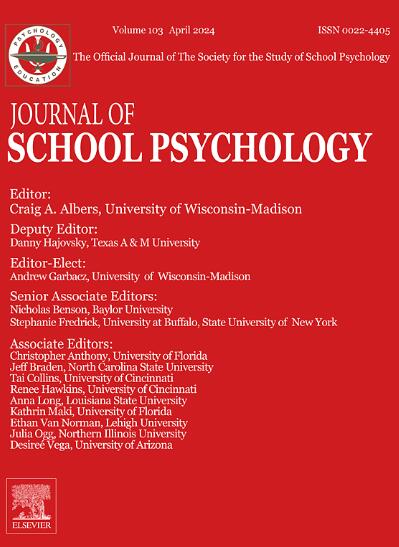Reconciling discrepant universal screening data to improve decision-making: A Bayesian logistic regression approach
IF 4.1
1区 心理学
Q1 PSYCHOLOGY, SOCIAL
引用次数: 0
Abstract
There are a substantial number of students with mental health needs who do not receive timely support. Universal screening is a promising practice for facilitating early intervention services. Multi-informant assessment is noted as a best practice for valid decision-making. However, this practice has not yet been applied to universal screening data. Universal screening utilizing a single rater (teacher) likely results in a significant number of students not being identified for support. This study (1) employed a Bayesian statistical model to incorporate students' background information (e.g., demographic variables; disciplinary referrals; social, academic, and emotional risk statuses) to generate estimates of academic risk, (2) used this background information to generate cut scores in a training sample and validate them in a test sample, and (3) identified the unique value of adding teacher and student self-reports with regard to sensitivity and specificity. Results demonstrated the promise of incorporating background information in the accurate identification of students with low, medium, and high risk for mental health needs. Implications for research and practice are discussed.
协调不一致的普遍筛选数据以改善决策:贝叶斯逻辑回归方法
有大量有心理健康需求的学生没有得到及时的支持。普遍筛查是促进早期干预服务的一种有前途的做法。多信息评估被认为是有效决策的最佳做法。然而,这种做法尚未应用于普遍筛查数据。使用单一评分者(教师)进行普遍筛查,很可能会导致大量学生无法被确定为需要支持的对象。本研究(1)采用贝叶斯统计模型,将学生的背景信息(如人口统计学变量;违纪转介;社会、学业和情绪风险状况)纳入其中,以生成学业风险估计值;(2)利用这些背景信息在训练样本中生成切分分数,并在测试样本中进行验证;(3)确定添加教师和学生自我报告在灵敏度和特异性方面的独特价值。结果表明,在准确识别有心理健康需求的低、中、高风险学生时,加入背景信息大有可为。本文讨论了研究和实践的意义。
本文章由计算机程序翻译,如有差异,请以英文原文为准。
求助全文
约1分钟内获得全文
求助全文
来源期刊

Journal of School Psychology
PSYCHOLOGY, EDUCATIONAL-
CiteScore
6.70
自引率
8.00%
发文量
71
期刊介绍:
The Journal of School Psychology publishes original empirical articles and critical reviews of the literature on research and practices relevant to psychological and behavioral processes in school settings. JSP presents research on intervention mechanisms and approaches; schooling effects on the development of social, cognitive, mental-health, and achievement-related outcomes; assessment; and consultation. Submissions from a variety of disciplines are encouraged. All manuscripts are read by the Editor and one or more editorial consultants with the intent of providing appropriate and constructive written reviews.
 求助内容:
求助内容: 应助结果提醒方式:
应助结果提醒方式:


